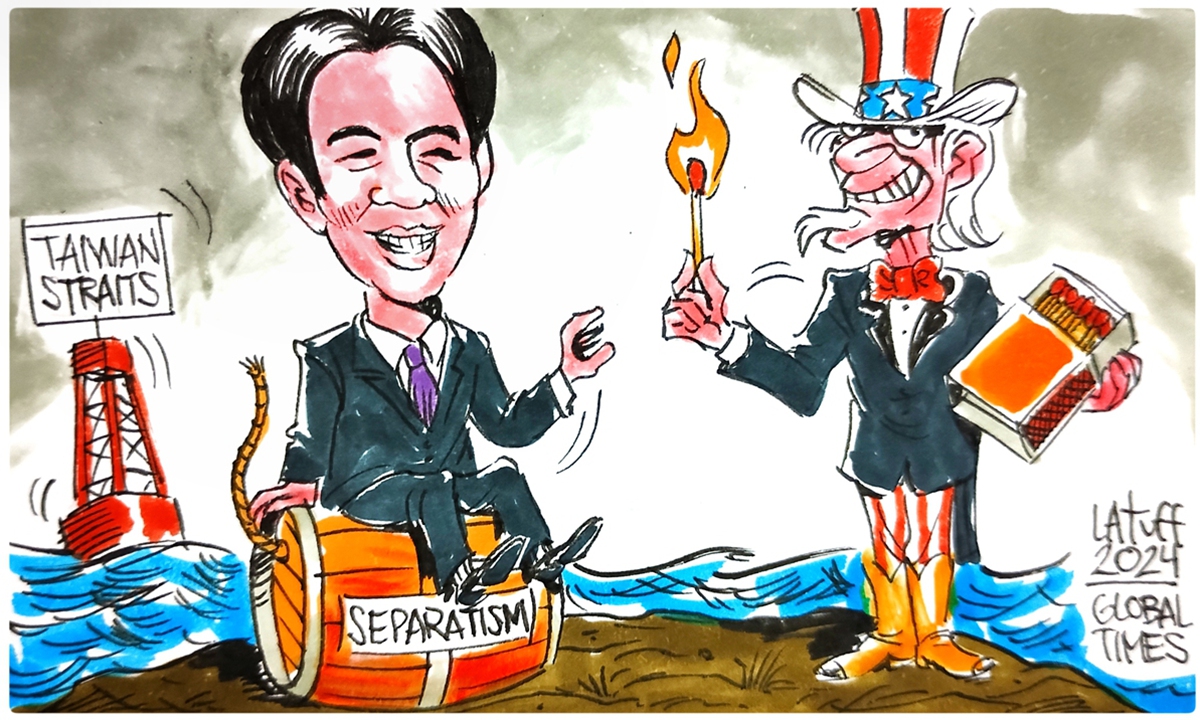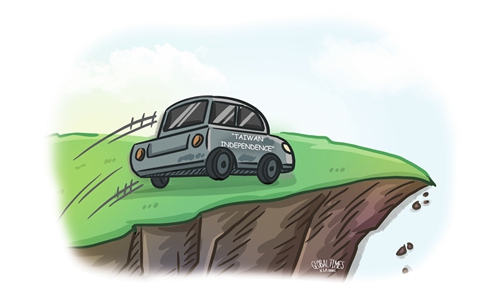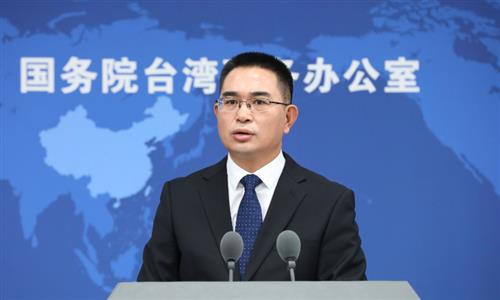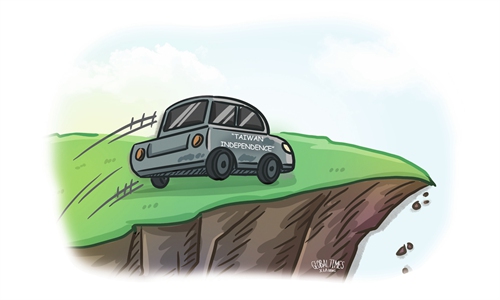
Condoning separatist forces means stocking flames in the Taiwan Straits. Cartoon:Carlos Latuff
Taiwan regional leader Lai Ching-te's "Double Ten" speech was steeped in hypocrisy. He outlined the "four unchanged." But the only thing unchanged is his pursuit of the "Taiwan independence." If the DPP's previous "independence" push was like slowly boiling water, Lai is now making a big change - getting the fire roaring.
Lai claimed "Our determination to defend our national sovereignty remains unchanged." This is a blatant provocation. Taiwan has never been a country and will never be a country, and thus has no so-called sovereignty. He is only peddling different versions of "Taiwan independence" narrative.
Lai asserted, "Our efforts to maintain the status quo of peace and stability in the Taiwan Strait remain unchanged." This is a prime example of a thief crying "stop thief." The situation in the Taiwan Straits has for quite some time been relatively peaceful, and cross-Straits relations have developed continuously. However, it is precisely the provocations from the "Taiwan independence" forces and international interference that have given rise to the storms in the waters. The "Taiwan independence" forces, represented by Lai, are the real culprits, injecting instability into the Straits while hypocritically emphasizing peace and stability. This is sheer nonsense.
Lai's wording that "our commitment to hoping for parity and dignity, and healthy and orderly dialogue and exchanges between the two sides of the strait remains unchanged" is simply empty rhetoric. The foundation for constructive dialogue between the two sides rests on acknowledgment of the fact that there is but one China in the world. Taiwan is an inalienable part of the Chinese territory. The government of the People's Republic of China is the sole legal government representing the whole of China. Lai's idea of "parity" across the Straits essentially implies a relationship between two sovereign states, which is nonexistent in the case.
Fourth, when he alleged that "our determination, from one generation to the next, to protect our free and democratic way of life remains unchanged," he used the guise of "democracy" to advance the agenda of "Taiwan independence." The rhetoric vilifies China's reunification as a threat to "democracy," distorts "One Country, Two Systems" into "one country, one system." His true aim is not to safeguard the so-called democracy for generations but to pursue "Taiwan independence" for generations.
Lai's speech seems to have implied that his policies are highly consistent. But is that the case? He is making changes.
These changes reflect his growing provocations. From rhetoric like "China and Taiwan are not subordinate to each other" he made in May 20 to it is "absolutely impossible" for "Communist China" to be Taiwan island's motherland uttered in early October, to the sneaky foreign visits of Lai and his predecessor Tsai Ing-wen, the DPP's rhetoric and actions are becoming more aggressive.
In the past, some observers described the DPP's policy of pursuing "Taiwan independence" as "boiling the frog in warm water," implying the subtle and gradual implementation of its objectives. However, unlike the approaches of the past, Lai is now adopting a more radical and overt strategy, as if he is stoking a fire to accelerate the process of "Taiwan independence."
Lai's boldness is largely due to his delusion that the Chinese mainland won't take action for reunification. It seems he does not understand that once the bottom line of the Anti-Secession Law is crossed, the Chinese mainland will inevitably adopt all necessary measures, including those that are not peaceful, as outlined in the law. When the possibility of peaceful reunification is lost, non-peaceful means will inevitably come into play; this is clearly stipulated in the legislation.
In June, Chinese authorities issued a set of guidelines on imposing criminal punishments on die-hard "Taiwan independence" separatists for conducting or inciting secession, allowing a trial in absentia in relevant cases. It spells out clearly defined circumstances in which a small number of die-hard "Taiwan independence" separatists, through acts such as organizing, plotting or carrying out schemes of "de jure independence," or seeking independence by relying on foreign support or by force, should be held criminally responsible. In August, a spokesperson of the Taiwan Work Office of the Communist Party of China Central Committee announced sanctions on "Taiwan independence" die-hards on a Chinese mainland's list.
Chinese mainland's countermeasures are on the way. Do the DPP authorities plan to push things to the brink of war before having a second thought?
Lai's other misconception is that, should the day of non-peaceful reunification arrive, the US will undoubtedly defend the Taiwan region. Looking at other conflicts, it's clear that the US will only stoke the flames, observe from afar, and capitalize on the chaos.
Anyone who is familiar with history knows that two of the US' greatest failures after World War II were on the battlefields of the Korean Peninsula and Vietnam. One major factor in these failures? China. At that time, China had no nuclear weapons and no intercontinental missiles. Today, the geopolitical landscape has shifted dramatically. And the delusions of the "Taiwan independence" forces are nothing more than self-deception.
Despite Lai's aggressive pursuit of the unrealistic goal of "Taiwan independence," it is clear that it is a path to nowhere. As a spokesperson of China's State Council's Taiwan Affairs Office said on Thursday, Lai's separatist provocations are the root cause of turmoil and instability in the Taiwan Straits, and this threatens disaster for the people of Taiwan.
The article is compiled by Global Times reporter based on an interview with Zheng Jian, a professor at the Taiwan Research Institute of Xiamen University. opinion@globaltimes.com.cn



